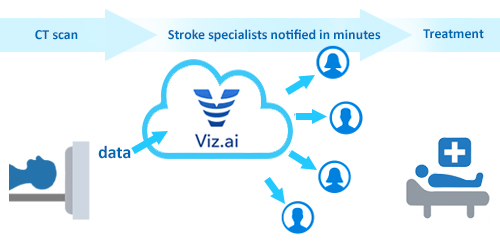A couple of times a day, the mobile phones of neurovascular specialists at Mayfield Brain & Spine start buzzing and blaring. A patient at a local hospital is having a stroke.
In the few minutes between when the patient undergoes a CT scan and the time the neurosurgeon gets that alert, a cutting-edge technology tool has kicked in – artificial intelligence (AI).
The algorithm on the cloud-based server, developed by a company called Viz.ai, analyzes the scan and data from millions of other cases in minutes to help physicians determine whether the patient is experiencing a large-vessel occlusion, a severe ischemic stroke when a vessel supplying blood to the brain is obstructed.

Dr. Andrew Ringer, Dr. Ryan Tackla and Dr. Jonathan Hodes, neurovascular specialists at Mayfield, are alerted to any case that arrives at the TriHealth or Mercy Health hospitals in Greater Cincinnati.
“We are making decisions together in real time within minutes of the study being completed,” Dr. Ringer said. “The idea is to make the best decision about the treatment that is best for that patient as quickly as possible.”
The traditional route would call for a radiologist to study every scan before a decision on treatment is made, which can take precious time. With the artificial intelligence system in place, advanced information is available immediately to the radiologist and other members of the medical team – in most cases within three minutes.
When saving a few minutes can make a difference in a patient’s outcome, the artificial intelligence system can help get a patient into the angiography suite immediately. Those alerts to a neurosurgeon and other health professionals are available anywhere, and a secure messaging platform allows instant communication with the medical stroke specialist, the emergency physician, the radiologist, the charge nurse at the hospital and others.
Those early interventions save lives. Every year, about 800,000 Americans will have a stroke (one every 40 seconds) and about 137,000 will die of a stroke (one every four minutes).